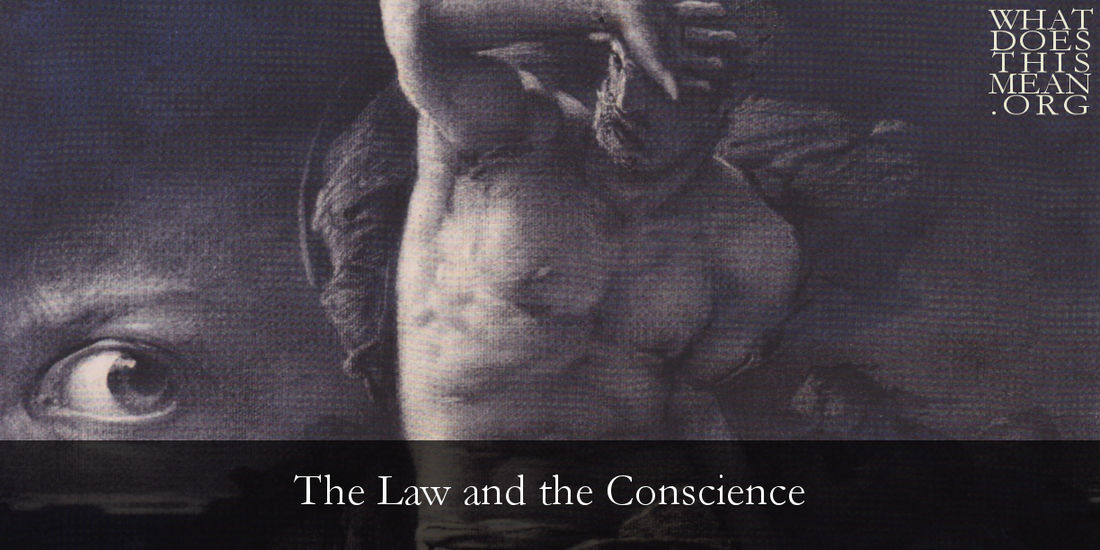And yet, there’s no denying that the conscience is a good part of God’s creation. An inner voice for every person, discerning right and wrong, helping him or her to live a God-pleasing life? You don’t need a bible or a sermon to know what is right and lawful (Romans 2:14), and this is because of the conscience. So where’s the problem? Why can’t we agree?
Luther says that the devil battles hard to keep us from the Law written on our hearts. The conscience gets twisted and muzzled so that one of two things happens. It either doesn’t speak loud enough when it should, or it won’t let us go when its work is done. Both are the work of the devil, keeping us from faith in Christ.
When the conscience doesn’t speak up like it should, it’s because it’s wearing blinders. It doesn’t see the Law written on our hearts, and so it doesn’t preach it to us. This is truly devilish, and why it’s so important to understand that the conscience isn’t the same as God’s Law, it’s the preacher of God’s Law. And a bad preacher drives people away from salvation instead of to it. When this happens, it’s because your conscience is failing to give you the warning about your sin which would normally send you to Christ for forgiveness. To live by the conscience alone is to live without the Gospel, because you may never realize how terribly you need the forgiveness Christ offers. This is one way the devil twists the conscience — by blinding it to the Law.
He can turn it in the other direction too, though. Some of us know the feeling of a conscience that won’t let go. The pit in the stomach. The inability to focus. Other people even see it. The topic — whatever it is — only needs to be mentioned, and the blood rushes to your face, you begin to sweat, you become distracted. That’s shame — something you don’t have without a guilty conscience. Now, the truth is that sometimes shame is the right reaction to what we’ve done. But it should lead us to repentance and faith — faith that Christ’s death was enough, also for this sin. Then the conscience is preaching the Law the way it should.
But then it should also stop. It has no more right to hold us hostage over sins forgiven by Christ than any person.
This is the other way the conscience can be twisted — so that it keeps accusing us after repentance. Then we hear the Gospel, which says: „Christ died for you. Your sins are forgiven. Leave this sin behind you, because your Lord will never think of it again.“ But it’s followed again by the conscience, which is still there saying: „Your sin was too big. It’s not that simple. This time, you also have to make remuneration. Don’t even step in that direction again, because you can’t ask for that much forgiveness again.“ These words are deadly to Christian faith. The conscience holds God’s Law in front of you exactly as it’s written on your heart, and tells you that faith’s not enough, that, because your sin was so horrible, your forgiveness has conditions. Maybe it’s subtle and deems the conditions voluntary, but it doesn’t matter. Martin Luther says that, at times like this, we have to condemn the Law as a heretic. There’s no place after the Gospel for dragging up old sins, for putting conditions on forgiveness.
Where your conscience is out of whack — and there’s always going to be at least a little truth in this — it’s either being too quiet or being too loud. You either don’t hear it at all, or you can’t escape it, no matter how hard you try. For both of these, the first remedy is God’s Word. First in the sermon, where the pastor does what your conscience can’t: Follow the preaching of the Law with the proclamation of the Gospel. But then in your own devotions as well, where you don’t just read the word, but study it and learn how God deals with his baptized children in grace. In the long term, these will teach your conscience when to speak up, and when to make way for the Gospel.
The second immediate remedy is to confess your sins and receive forgiveness from your pastor. If the problem is that your conscience is too quiet, this will mean doing its job for it, comparing your life to God’s Law, without its help. Use the Ten Commandments in Exodus 20 or the Small Catechism, or Matthew 5:21-42. This will train your conscience to see God’s Law as God wrote it on your heart. And with the absolution you receive, your faith will be in the sufficiency of Christ’s work instead of the goodness of your own. And if the problem is that your conscience won’t quit and makes you doubt that sufficiency, this is the place where you name the sin that your conscience won’t let go of, and hear the absolution — God’s forgiveness — spoken for that sin, for you. Then receive Holy Communion. In that bread and wine, which YOU receive, is the body and blood of Christ for YOUR forgiveness. Receive both, absolution and communion, from the pastor as from Christ himself. This is more sure than your conscience will ever be, but given time, with the Word of God, it can be taught.



 RSS Feed
RSS Feed
